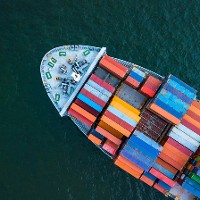10 November 2021
How free trade can prevent hunger caused by climate change
Climate change is expected to reduce crop yields, increase food prices globally, and potentially expose an additional 77 million people to the risk of hunger by 2050.
There are clear differences between regions. Expectations are that sufficient food will remain available in the Northern hemisphere, but in regions such as Sub-Saharan Africa or South Asia, falling crop yields may lead to higher food prices and a sharp rise in hunger.
While the continued growth of international trade has increased the ability of global food systems to compensate for the differing regional effects of climate change, the authors of a new policy brief published in Nature Climate Change say that more liberalization and trade facilitation could help meet UN Sustainable Development Goal 2: to end global hunger.
“International trade can substantially contribute to climate change adaptation by reducing the global hunger impacts driven by the increased pressure of climate change on agricultural markets,” explains study coauthor and Integrated Biosphere Futures Research Group Leader Petr Havlik. “However, tariffs and quantitative trade restrictions, as countries sometimes implement in response to crisis situations, tend to aggravate hunger impacts from climate change.”
The researchers’ recommendations outlined in the paper are based on 60 scenarios that take into account different forms of trade policy, along with climate change varying from a 2°C to a 4°C warming of the Earth, with 2050 set as the horizon for each scenario.
“Lowering tariffs and infrastructure-related barriers mitigates hunger impacts in import-oriented regions, but caution is needed to avoid food price increases in export-oriented regions. Opening to trade may further expose farmers in severely hit import-oriented regions, which calls for holistic development programs to redistribute benefits and compensate income losses,” says policy brief lead author Charlotte Janssens, a guest researcher in the Integrated Biosphere Futures Research Group who is also associated with KU Leuven in Belgium.
According to the authors, trade agreements should better account for adaptation by preventing border restrictions, facilitating trade, and identifying distributional consequences and safeguards in future oriented impact assessments.
Reference:
Janssens, C., Havlík, P., Krisztin, T. , Baker, J., Frank, S. , Hasegawa, T., Leclère, D., Ohrel, S., et al. (2021). International trade is a key component of climate change adaptation. Nature Climate Change 10.1038/s41558-021-01201-8. (In Press) http://pure.iiasa.ac.at/id/eprint/17610/

NEWS
"Climate Modernity" - The 24H Challenge: How do we want to live and act in the future in Styria ?
Health fears can increase pandemic isolation habits in older Europeans
How circular waste management systems can benefit the environment
Launch of the Northern African Applied Systems Analysis Centre
How we measure the effects of methane matters for climate policy


